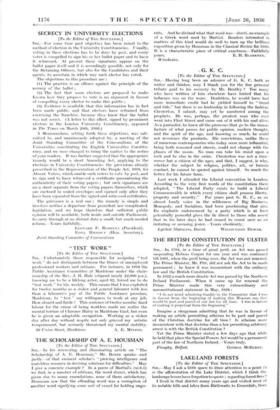G. K. C.
[To the Editor of THE SPECTATOR.] Sin,—Having long been an admirer, of G. K. C. both as writer and thinker, may I thank you for the fine personal tribute paid to his memory by Mr. Bentley ? Too many who have written of him elsewhere have hinted that his influence was on the wane. Doubtless, he would have had more immediate credit had he yielded himseif to " trend and tide," but there is no leadership in following the fashion. Chesterton, I submit, may yet be numbered among the prophets. He was, perhaps, the greatest man who ever went into Fleet Street and came out of it with his soul alive. As a journalist, he knew all the processes that go to the manu- facture of what passes for public opinion, modern thought, and the spirit of the age, and knowing so much, he could not reverence the products. His convictions, unlike those of numerous contemporaries who today seem more influential, being both reasoned and ,sincere, could not change with the phases of the moon. No man can take his stand upon a rock and be also in the swim. Chesterton was not a time- server but a citizen of the ages, and that, I suggest, is why, whether the subject be religion, politics, art, or human conduct, he cannot be quoted against himself. So much the better for his future fame.
Last week I attended the Liberal convention in London. According to the very first words of the constitution there adopted, " The Liberal Party exists to build a Liberal Commonwealth in which every citizen shall possess liberty, property and security." For years past G. K. C., as an almost lonely voice in the wilderness of Big' Business, Monopoly, and Socialism, had been proclaiming that aim. Its emphatic endorsement by a party which is at least potentially powerful gives the lie direct to those who assert that in his later days he had ceased to count save as an irritating or amusing jester.—Yours obediently,










































 Previous page
Previous page